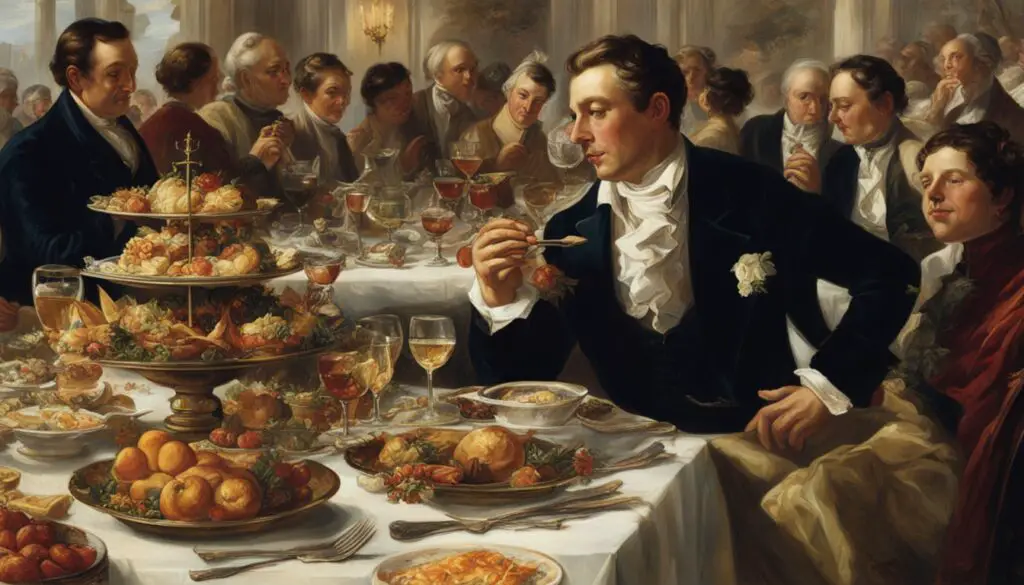Tantalus stands out in Greek mythology as a king of Sipylus, which was near Lydia and Phrygia. He was unique because he was Zeus’s son.
This gave him both power and brought his downfall. Tantalus was rich and his kingdom flourished.
Unfortunately, he was known for his crimes against the gods. Zeus punished him severely.
Tantalus’ story is more than a tale of wealth. It’s a warning about pride and the consequences of our actions.
Tantalus’ myth warns about being too bold and facing punishment from the gods. He was in Hades, under a tree with unattainable fruits and water he couldn’t drink.
He faced eternal thirst and hunger. His story is a lesson, shared with others who dared challenge divine authority.
His family’s story is also tragic, including his son Pelops and daughter Niobe. Even today, “Tantalean punishment” is used to describe great suffering and missed opportunities.
Key Takeaways
- Tantalus was a legendary king of Sipylus.
- He was condemned by Zeus to suffer eternal thirst and hunger in Hades.
- The Tantalus story is a cautionary tale about the repercussions of hubris.
- Tantalus’ punishment involved being perpetually unable to reach food and water.
- His myth highlights the severe consequences of defying the gods.
- The proverb “Tantalean punishment” stems from his perpetual plight.
- Tantalus is part of the cursed House of Atreus, a lineage marked by misfortune.
The Origins of Tantalus
Tantalus is a key figure in Greek myths, known for his story of punishment and unrealized wishes.
His tale ties him closely to the gods of Olympus.
Parentage and Birth
Tantalus was in a special spot in Greek myth because of his partly divine family. Zeus and the nymph Pluto were his parents, making him part god.
Some stories say his father was Tmolus, but most believe it was Zeus. Being part of the Tantalus family tree was a big deal for him.
Divine Connections
As Zeus’s son, Tantalus had connections to the divine. This gave him special access and status among the gods.
His family tree included heroes like Theseus. This made Tantalus pretty important in Greek tales.
His noble birth and divine links play major parts in his famous story. Seeing that his family tree includes Zeus and Pluto, we note how his story mixes human and godly themes.
This makes his story fascinating and rich.
Tantalus’ Kingdom and Wealth
In Greek mythology, Tantalus was the ruler of Sipylus, a place in ancient Anatolia. It was well known for being rich, thanks to its great lands and many precious minerals.
The Kingdom of Sipylus
Tantalus governed Sipylus, which stood out as one of the richest places in ancient Anatolia.
Located in Phrygia and Lydia, it was blessed with fertile fields, herds of animals, and plentiful crops. The Pactolus River flowed through, making the land even more valuable with its gold.
The Wealth of Tantalus
Known for his immense riches, Tantalus’ wealth was compared to that of King Midas.
The gold from Mount Sipylus and his divine connections made him very prosperous. He entertained the gods in his grand palaces, showing off his fortune.
But his tale also warns against greed. Tantalus faced troubles, which reminded us of the risks of wanting too much.
This lesson from his life is still important today as we think about what matters most.
The Crimes of Tantalus
Tantalus is famous in Greek myths for his arrogance. His pride led him to disobey the gods, facing harsh results.
His stories focus on how he betrayed trust and what happened because of it.
Secrets of the Gods
Tantalus shared private god’ talks with other people. This act broke a lot of trust between him and the deities.
It paved the way for his eventual unfortunate end.
The Theft of Ambrosia and Nectar
He also stole the food and drink of gods, ambrosia, and nectar, giving them to humans. This was a clear insult to the divine and caused chaos.
The gods were deeply upset by this action.
The Sacrifice of Pelops
Tantalus’s worst offense was sacrificing his son, Pelops, to see if the gods were all-knowing. This did not go unnoticed by the deities, except Demeter.
The gods brought Pelops back to life, showing their disapproval of Tantalus’s act. This act led directly to Tantalus’s punishment in the underworld.
The stories of his actions still warn of the dangers of angering the gods.
Who Was Tantalus?
Tantalus is a famous and tragic character from Greek mythology. He came from Sipylus, a legendary kingdom.
Tantalus was Zeus’ and Plouto’s son, giving him a special divine connection. His story tells of great pride and the terrible outcome of betraying the gods, despite him once being a guest at Mount Olympus.
Tantalus was arrogant, thinking he could trick the gods. This wrong belief led him to a terrible fate.
Even though his people saw him as a good ruler, he made a big mistake. He served the gods a meal made from his son Pelops.
The gods were deeply upset and rejected the meal, showing how much they despised what Tantalus did.
After this, no one in Tantalus’ kingdom made offerings to the gods. This shows how angry and upset the gods were.
At first, some were displeased by how Tantalus was treated. But soon, people turned away from him, even forgetting his once-famous royal gardens.
This turning away marked the end of Tantalus’ honor.
Tantalus faced a cruel and fitting punishment. He was sent to Tartarus, where he would always be thirsty and hungry.
This is where the term “tantalize” comes from. He saw water he could not drink and fruit he could not eat.
His punishment affected his family greatly, including figures like Pelops and Niobe, and also taught future generations a significant lesson.
His story is a warning about disrespecting the gods. Tantalus’ terrible fate is a prime example of the consequences of overstepping divine authority.
It also underscores the important Greek idea of hubris, making his narrative an enduring part of ancient legends.
The Punishment of Tantalus
Tantalus, once a king, was cursed for his terrible deeds. He was sent to Tartarus, a part of Hades.
This place was for the worst sinners. Tantalus’s never-ending punishment stands as a warning in Greek myths.
Condemnation to Tartarus
Zeus sent Tantalus to the darkest underworld for his crimes. Tantalus offended the gods by gossiping about their plans.
He even stole their special food and tried to feed his son in a terrible way to the gods.
The Eternal Thirst and Hunger
His punishment was thirst and hunger which could never be satisfied. He stood in water that vanished before he could drink.
Fruits hung just out of reach. The term “to tantalize” comes from his cruel punishment. Even Odysseus was horrified by what he saw of Tantalus’s fate.
The Overhanging Rock
Tantalus faced another peril, a rock that threatened to crush him. This added fear to his endless suffering.
The overhanging rock represented his uncertain destiny. Therefore, Tantalus’s torment was both physical and mental, lasting forever.
The Legacy of Tantalus

The tale of Tantalus goes far in history and is deep in our languages and cultures. His sad story has blended into how we talk each day.
It shows up in many common phrases and sayings.
Influence on Language
Tantalus has had a big effect on our words. The term “tantalize” comes from his myth, where he reached for water and fruit he couldn’t touch.
Tantalize now means to tease with something you can’t have. This links directly to Tantalus’ story of forever missing out on what was so near.
The Proverb “Tantalean Punishment”
Tantalean punishment is a phrase that describes never-ending wanting. It comes from Tantalus’ story.
People use it to show a feeling of never being satisfied. It connects to his punishment of always wanting but never getting.
Tantalus’ Family and Offspring
The story of Tantalus’ family is filled with both glory and sorrow. His children, like Pelops and Niobe, play key roles in ancient Greek tales.
These stories show the lasting impact of Tantalus’ family on myth.
Children of Tantalus
Tantalus had many children who became important in Greek myths. His son, Pelops, was saved by the gods from his father’s wicked plan.
Even with a disability, Pelops achieved great things, like marrying Princess Hippodamia after a thrilling race.
But Pelops fell to his sins, cursing future generations. Niobe, his sister, was also proud and lost her children to the gods’ anger.
The gods turned her into stone, forever grieving. These tales show how Tantalus’ actions affected his family’s fate.
The House of Atreus
The family curse affected the House of Atreus deeply. It includes greats like Agamemnon and Menelaus, key players in the Trojan War.
Tragedies of betrayal and sorrow marked their lives.
Agamemnon faced treason from his flesh. Menelaus saw many wars and marriage issues.
Their stories warn of the lasting effects of Tantalus’ mistakes.
Artistic Depictions of Tantalus

The story of Tantalus captivates artists and writers, leading to many stunning depictions. These artworks vividly show his endless suffering.
Paintings and Sculptures
Artists like Gioacchino Assereto and Francisco Goya have painted Tantalus in moments of torment.
Their works highlight his never-ending hunger and thirst, forever unfulfilled. An outstanding example is the “Tantalus” painting from the 17th century.
It’s part of the “Las Furias” series, found in Madrid’s Palacio del Buen Retiro. This piece is a compelling imitation of Ribera’s style, created by an unknown artist.
It’s highly regarded and cataloged in important art collections.
This painting is quite large; it stands at 190 cm tall and 226 cm wide. It holds a high value, typically estimated between 3000 to 4000 doblones.
Notably, the artwork bears the numbers 1648 and 540 at its front, on the lower right.
Literary References
In literature, Tantalus’s story is a prominent figure, symbolizing unreachable desires. His narrative influences various Greek myths and stories.
His punishment in Tartarus is a key representation of divine justice. It has inspired authors from ancient times to the present day.
The myth of Tantalus goes beyond his tragedy, showing his significant impact. He is a pivotal figure in different art forms and narratives, symbolizing the pursuit of justice.
Artists and writers continue to explore his story, making it a lasting element of cultural history.
The Curse of the House of Atreus
The curse of Atreus is a key part of Greek myths. It shows how divine retribution and suffering never end.
Tantalus started it by feeding the gods his son, Pelops. This terrible deed led to a curse on his family that continued for generations.
The Misfortunes of Niobe
Niobe, Tantalus’ daughter, met a tragic end due to the curse. She bragged about her children, angering Apollo and Artemis.
They then killed all her kids. This sad story of Niobe reminds us of the cost of arrogance and keeps the curse alive.
Pelops and His Descendants
Even Pelops couldn’t escape the curse. He tricked King Oenomaus and married his daughter. But this led to more tragedies.
His sons, Atreus and Thyestes, committed terrible acts, like killing each other. Their crimes made the curse on their family even worse.
Pelops’ heirs like Agamemnon and Menelaus faced their troubles. Agamemnon, who led the Greeks against Troy, made a dreadful sacrifice for a better chance at war.
But he ended up being killed by his wife and her lover. This shows the family’s fate was doomed from generation to generation.
The end came when Agamemnon’s son, Orestes, took bold action. Seeking help from the gods, he made up for killing his mother.
This act shows that by understanding the need for justice and turning to the divine, a curse can finally be lifted.
Tantalus in Modern Culture

Tantalus’s story has had a big impact on our culture. His tale is often mentioned in books and art. Homer’s Odyssey was one of the first works to highlight Tantalus’s story.
When Odysseus visits the Underworld, Tantalus is a key point. This shows how his influence in literature and myths lasts through the ages.
In Thyestes by Seneca, Tantalus’s ghost plays a vital role. It indirectly affects his family’s sad fate.
His story also appears in plays about his family, like those of Agamemnon, Orestes, and Iphigenia at Aulis.
This deepens the way we see Tantalus in modern times. An ancient text by Hyginus even claims Tantalus fed his son, Pelops, to the gods.
A major event celebrated Tantalus’s story through theater, called “Tantalus.” It involved 10 plays and was very expensive, costing over $10 million.
The project took half a year of rehearsals. Originally, it was designed to be a 15-hour show but was reduced to 10 hours.
This epic production highlights Tantalus’s lasting impact on theater. For more on this event, check here.
The word “tantalize” comes from Tantalus’s punishment in the afterlife. He’s always near food and water he can’t reach.
This story has influenced our daily language. It shows how deeply his tale is rooted in our culture.
His myth has also inspired stories about human mistakes and the punishment that follows. These stories are still popular today.
Looking into Tantalus’s story shows how wide his influence is. It’s not just in literature and plays, but also in how we think about human nature.
His myth’s themes of wanting too much and never being satisfied are relevant in modern times.
They often show up in art and discussions about our nature and fate. For more context on Tantalus, visit this source.
Although there are no plays solely about Tantalus’s punishment, we see his story reflected in other works.
The 10-hour show and many artworks keep his tale alive. Learning about his family’s curse and his mythological roots is interesting.
You can find more information on Tantalus here.
Key Themes in the Tantalus Myth
The myth of Tantalus explores the line between humans and gods. It shows the complexity in Greek myths, focusing on themes like trust and betrayal.
The Relationship Between Mortals and Gods
Tantalus was different because of his family line. He showed us that even with such a connection, trust and respect between humans and gods are crucial.
He stole from the divine and fed his son, sending a message about arrogance and punishment.
Divine Justice and Punishment
The gods’ reaction to Tantalus shows their firm laws. He was punished severely as a lesson to all.
His endless struggle with hunger and thirst is a warning against mortal pride and shows how the gods’ justice is fair but firm.
Tantalus’ story carries important warnings for us still. It’s a lesson on the dangers of challenging the gods’ authority.
The Impact of Tantalus on Greek Mythology

The story of Tantalus is key in Greek myths, warning us about the dangers of upsetting the gods.
It shows what happens when mortals go too far, breaking the rules set by the divine. This tale highlights the ancient view on the limits of behavior towards the gods.
Tantalus was the child of Zeus and Pluto. He did terrible things, like killing his son and feeding him to the gods.
This crime showed just how important family and guests were in ancient society. His never-ending punishment in the Underworld is a symbol of his wrongdoings.
His story is linked to others through family connections. His lineage was filled with tragedies caused by arrogance toward the gods.
This shows the themes of respect for family and the power of divine forces in Greek myths.
Other versions of the Tantalus story focus on different misdeeds. They all highlight the price of challenging the gods’ authority.
The complex interactions between humans and deities are a common theme, showing the Greeks’ belief in a world ruled by both actions and fate.
The Tantalus myth is rich in lessons about the consequences of disobeying the divine. It teaches us the importance of respecting the gods’ will, a mainstay in ancient Greek culture.
This story warns of the dangers of hubris, providing valuable moral teachings to its listeners.
Conclusion
In conclusion, Tantalus’ story from Greek mythology teaches us about big ideas like being too proud, what’s fair, and the complex link between gods and humans.
His tale shows us the everlasting yearning of the human heart. This is seen in his punishment in the Underworld, where he can never quench his thirst or hunger.
His wrongdoing, like sharing the gods’ secrets and doing bad things, led to this eternal suffering.
The legend of Tantalus has deeply affected our language and culture. The word “tantalized” echoes his never-ending struggle.
It reminds us of the everlasting chase toward our goals, desires, and hopes. Tantalus’ myth offers a timeless lesson about being careful with our ambitions and not reaching too far.
This story remains influential in today’s books and art as a symbol of our deep desires and the risk of aiming too high.
Lastly, Tantalus’ tale highlights the powerful messages found in Greek myths and tragedy.
It teaches us to cherish the present and consider our wants. It’s a call to be mindful of our choices.
The impact of Tantalus’ narrative shows the lasting value of Greek myths. They still offer us wisdom and insight for our modern lives.
These ancient stories help us understand and navigate the challenges of the present.
Frequently Asked Questions
What did Tantalus do to get punished?
Tantalus was punished for stealing ambrosia and nectar from the gods and revealing their secrets to mortals. He also attempted to serve his own son as a meal to the gods, testing their omniscience.
Who was Tantalus in the Odyssey?
In the Odyssey, Tantalus is mentioned as one of the souls Odysseus encounters in the underworld. He is described as eternally tormented by hunger and thirst, unable to reach nearby food and water.
What is Tantalus and Sisyphus?
Tantalus and Sisyphus are two figures from Greek mythology known for their eternal punishments in the underworld. They are often mentioned together as examples of divine retribution for offenses against the gods.
Why did Tantalus sacrifice his son?
Tantalus sacrificed his son Pelops to test the gods’ omniscience. He wanted to see if the gods would recognize the meat as human flesh and refuse to eat it.
Why did Tantalus punish Annabeth and Percy?
Tantalus did not punish Annabeth and Percy in Greek mythology. This reference likely comes from a modern adaptation or retelling of the myth, such as in the Percy Jackson book series.
Who was Tantalus married to?
In Greek mythology, Tantalus was married to Dione, one of the Pleiades. Some sources also mention him being married to Euryanassa or Eurythemista, though accounts vary.




